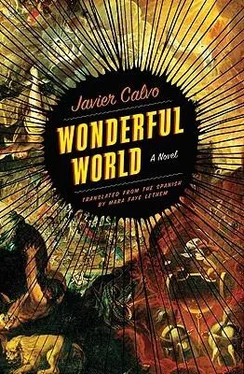CHAPTER 37. A Bench in the Park
The park on the outskirts of Barcelona where Matilde Saudade and her son Cristian have agreed to meet with their husband and father, respectively, is one of those parks on the outskirts of Barcelona with a cement floor and rusty metal constructivist sculptures. The only places in the park where the color gray doesn't prevail are those places where the wastebaskets are overflowing with fast-food wrappers, soft-drink cans and pornographic magazines. An irritated-looking pigeon alights on the ground in front of the bench where the three members that comprise the Saudade family unit are seated, and pecks at the grime on the cement floor. Looking to either side with an irritated expression. The three members of the Saudade family unit have been sitting for five minutes in silence on a metal bench in the park that gives its name to their neighborhood. Juan de la Cruz Saudade takes a pack of Fortuna cigarettes from the pocket of his powder blue and white sweatshirt and puts one between his lips. The new year has brought with it a cold snap that the press is calling Siberian. Siberian cold snaps are inexplicable, but relatively normal, occurrences in Barcelona's climate. Matilde Saudade extends a hand in a silent request for a cigarette but her husband has already put the pack back in his pocket.
“I talked to my mother and my sisters.” Matilde Saudade sighs, sitting on the bench in a vaguely childlike position, swaying her legs, grabbing the edge of the bench with her hands and looking at her feet. “They say I have to give you another chance. The last chance. Honestly, I don't understand why I have to give you another chance. I don't see any difference between this time and the ones before. Or why I have to let you come home.”
Matilde Saudade's most characteristic facial trait is a nervous tic that makes her compulsively wrinkle her forehead at regular intervals, as if she were surprised about something approximately every half second. The tic also makes everything she says sound slightly hesitant. As if she herself didn't believe the words that were coming out of her mouth. Matilde Saudade is wearing white stretch jeans and high-tops and a sweatshirt of a well-known sports brand that is actually an imitation of that brand's sweatshirts. Saudade's sweat suit is the official Umbro sweat suit of his favorite soccer club. The way the three members of the family are seated is the following: (a) Matilde Saudade on the right side of the bench, grabbing its edge with her hands and not looking directly at her husband or her son; (b) Cristian Saudade in the middle, covering his ears with his hands; and (c) Juan de la Cruz Saudade on the left side of the bench. Not so much seated as lounging with his legs open very widely and his head resting on the part of the back of the bench where most people rest their backs, smoking with large puffs and exhaling the smoke in his son and wife's general direction.
“Come home?” Saudade frowns. “But you're the one who left home. Taking my son with you, by the way. Must be one of those illegal things.” He searches for the words. “Abandoning the home or something like that. I think it's seriously illegal. And I have a right to see my son, don't I?”
“And I have a right to break that bitch's face.” Matilde looks up and wrinkles her forehead spastically. “And the bitch up and reports me for breaking her face. Her bitch-ass face.”
The irritated-looking pigeon that landed in front of them is now moving its head from one side to the other to look alternately at Saudade and his wife. With an element of irritation in its gaze that seems to contain elements of repressed rage. Eight-year-old Cristian Saudade is still sitting in the same position: covering his ears with his hands and with his eyes tightly shut. Saudade exhales smoke from his cigarette and makes an annoyed face.
“Here we go again,” he says. “We've talked about this a thousand times. About your imagining things. Didn't I have my friend Aníbal call you and swear there was no one but you?” He pauses and adopts the tone of emphatic indignation that he always adopts when he suddenly thinks of a point in his favor in the middle of an argument. “Aren't you ashamed to make up all this shit in front of our son? These kinds of things get stuck in kids' heads. They can turn into fags.”
Juan de la Cruz Saudade and Matilde Saudade both look at their son Cristian, who is sitting between them with his eyes closed and his hands over his ears. Matilde pats him on the shoulder.
“Why don't you go play?” Matilde says when he takes his hands off of his ears. “And leave me and your father alone for a little while?”
Eight-year-old Cristian Saudade stares at his mother impatiently.
“How can I go play?” he says. “I don't know anyone in this park. What am I gonna play?”
Matilde Saudade shrugs her shoulders as her son covers his ears with his hands again. Juan de la Cruz Saudade is smoking with that satisfied expression of someone convinced he's winning an argument.
“If it's all in my imagination,” says Matilde, “then who's that English bitch whose face I broke?” She pauses and a proud tone creeps into her voice. “They had to put four stitches in her head.”
Juan de la Cruz Saudade throws his cigarette butt to the ground beneath the pigeon's gaze filled with repressed rage. He shrugs his shoulders.
“She's not English,” he says. “And it's normal that you have to vent your anger on somebody once in a while.” His tone of voice has taken on that vaguely condescending tinge of someone forced to concede a minor dialectic point to their opponent. “It's not easy being a woman. Especially when your period is about to come. It's not me who says so. It's the doctors.”
A group of teenagers of Latin American descent occupy a metal bench located right in front of the metal bench where the Saudade family is seated. They place a large portable sound system on the ground and then someone pushes the PLAY button on the compact disc player. A hip-hop song at full blast invades the park's relative silence. The pigeon that was watching the Saudades flies off with a furious expression toward another area of the park, one that is free of urban subcultures. The teenagers begin to move to the music's vaguely jungle rhythm and to improvise rhyming lines of rap while a couple of them are rolling hash joints. They are all wearing enormous pants and some sort of handkerchiefs knotted around their heads that are morphologically similar to giant condoms.
“My brother says he's going to break your face,” says Matilde Saudade, raising her voice to be heard over the hip-hop music. “If he sees you on the street.”
Juan de la Cruz Saudade stares at his wife with a perplexed expression.
“Your brother is gonna break my face?” he says, as if his wife's statement involved some sort of enigma. “Mine? But he works in a restaurant. How tall is your brother? And when has he ever broken anyone's face?”
“He works in a pizzeria.” His wife wrinkles her forehead in three consecutive expressions of surprise. “And he doesn't work in the pizzeria. He delivers the pizzas on a motorcycle. I mean he's strong. And at least my brother worries about me. He worries about what happens to me and all that.”
The Latin American teenagers continue rehearsing dance steps that make them seem, alternately, like robots, marionettes and people with central nervous system disorders. The vaguely rhyming sentences that they rap in time to the music are peppered with the words “respect,” “brother” and “city.”
“I worry about you,” says Saudade, lighting another cigarette. “I'm worried right now.”
Cristian Saudade takes his hands off of his ears.
“Grandma says that if she has to put up with our shit one more day,” he says, “she's going to be the one to pack her bags and get as far away as possible.” He pauses and looks with a thoughtful expression at the group of teenagers that are moving like people with central nervous system disorders. “She says that she knew that all this was going to happen when my father hooked up with that chick on your wedding day.”
Читать дальше












